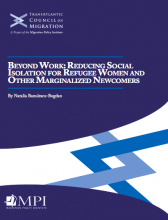Beyond Work: Reducing Social Isolation for Refugee Women and Other Marginalized Newcomers
Recently arrived migrants and refugees who are not employed are at high risk for social and economic isolation. This population is largely made up of women, refugees, the elderly, and migrants who are unskilled or illiterate. Beyond Work: Reducing Social Isolation for Refugee Women and Other Marginalized Newcomers from the Migration Policy Institute explores what successful integration looks like for newcomers who cannot find traditional employment or need more time to acquire the necessary skills. Usually considered “something of an afterthought in immigrant integration programming,” these groups, according to the author, are deserving of greater attention and perhaps a different set of metrics (other than employment outcomes) for evaluating their progress towards integration. The report first discusses the marginalization risks these migrants face including mental health challenges, feeling like a burden on the larger society, and transmitting secondhand trauma to children, as well as the barriers to economic participation including low skill level, ill health, age, language differences and traditional gender roles. The authors assert that employment can improve mental health and self-esteem, and foster social interactions, especially between newcomers and long-term residents. Reaching out to vulnerable populations by prioritizing “work-adjacent” activities such as volunteering and fostering economic empowerment through activities such as crafts, cooking and gardening can bring about positive results. The report also recommends creating non-work initiatives such as sports, arts, mentoring and peer-to-peer programs that encourage social ties and connect migrants with locals. However, to achieve such a goal in the world’s current migration crisis, the report posits that more complex measures of successful integration need to be established, programs need to be tailored to specific migrant populations, and that government must improve coordination with civil-society organizations which have often taken the lead in reaching out to hard-to-serve populations. (Prepared by the Immigrant Learning Center’s Public Education Institute)
Banulescu-Bogdanz, N. (2020, January). Beyond work: Reducing social isolation for refugee women and other marginalized newcomers. Retrieved from Migration Policy Institute website: https://www.migrationpolicy.org/research/reducing-social-isolation-refugee-women-newcomers

